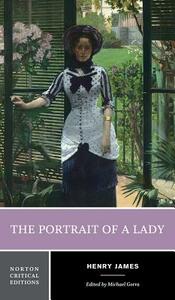Take a photo of a barcode or cover
reflective
slow-paced
reflective
slow-paced
Plot or Character Driven:
A mix
Strong character development:
Complicated
Loveable characters:
No
Diverse cast of characters:
No
Flaws of characters a main focus:
Complicated
emotional
slow-paced
challenging
emotional
funny
sad
medium-paced
dark
hopeful
reflective
sad
medium-paced
Plot or Character Driven:
A mix
Strong character development:
Complicated
Loveable characters:
Complicated
Diverse cast of characters:
Complicated
Flaws of characters a main focus:
Yes
I both love and hate The Portrait of a Lady. It's so incredibly frustrating that I find rereads quite painful—Isabel, why are you such an idiot? But when you consider how sexually repressed poor James reportedly was, the repression that underlies this novel becomes almost delicious in its intensity. You can't help feel for poor Ralph Touchett, walking around with his hands in his pockets, or even for idiot Isabel, finding nothing but terror in the climactic "white lightning" kiss. I appreciate this book more and more every time I go back to it, but afterwards I always need to read a lot of porn.
mysterious
reflective
slow-paced
Plot or Character Driven:
Plot
Strong character development:
No
Loveable characters:
No
Diverse cast of characters:
No
Flaws of characters a main focus:
Yes
emotional
sad
medium-paced
Plot or Character Driven:
Character
Strong character development:
Complicated
Loveable characters:
Complicated
Diverse cast of characters:
N/A
Flaws of characters a main focus:
Yes
An anthem to divorce. Also goodreads reviewers are LITERALLY misogynists for finding Isabel hypocritical. Or rather, not finding Isabel's "hypocrisy" compelling. And since this is goodreads, I can talk off the cuff however I want rather than actually looking at secondary criticism: Portrait isn't as simple as a morality tale about women gaining power = tragedy, but rather about how patriarchy warps this sense of freedom, and how it's most insidious in terms of control of wealth and property. With no material sense of freedom, Isabel turns down marriage offers because it's her primary avenue of power, then, bolstered by the false promise that her inheritance grants her freedom, she marries a shitty guy. To me Osmond is fascinating as well, beyond acting as a lurid villain (goodreads people who complain about how boring every book is should thank Henry James for throwing in some scheming and plotting). He's a terrifying representation of men who pretend be detached from the world while also caring only for appearances. Of course Isabel returns to Osmond at the end! -- what matters is how she sees her marriage and how she portrays her marriage to others, and the ambiguous dignity found in fucked up heteropatriarchal marriages of money.
I read this on LibriVox (volunteer read public domain audiobooks), wonderfully read by Elizabeth Klett!!!
I read this on LibriVox (volunteer read public domain audiobooks), wonderfully read by Elizabeth Klett!!!





